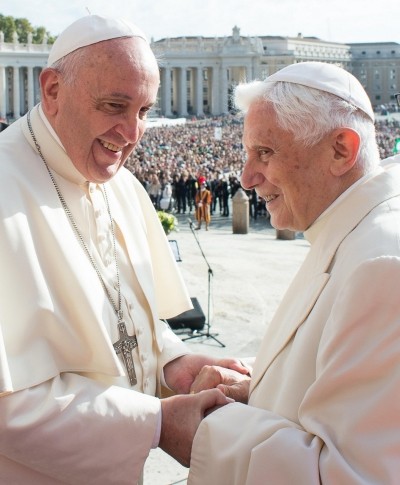(14/4/16) In Amoris laetitia, Pope Francis goes back to the teachings of Benedict XVI and broadens them. We offer our readers a list of quotes by Pope Ratzinger included in the recent Apostolic Exhortation, so that everyone can appreciate them.
70.“Pope Benedict XVI, in his Encyclical Deus Caritas Est, returned to the topic of the truth of the love of man and woman, which is fully illuminated only in the love of the crucified Christ (cf. No. 2). He stressed that ‘marriage based on an exclusive and definitive love becomes an icon of the relationship between God and his people, and vice versa. God’s way of loving becomes the measure of human love’ (11). Moreover, in the Encyclical Caritas in Veritate, he highlighted the importance of love as a principle of life in society (cf. 44), a place where we learn the experience of the common good”.
89. The word “love”, however, is commonly used and often misused [Cf. Benedict XVI, Deus caritas est (25th December 2005), 2: AAS 98 (2006), 218.]
147. This calls for a pedagogical process that involves renunciation. This conviction on the part of the Church has often been rejected as opposed to human happiness. Benedict XVI summed up this charge with great clarity: «Doesn’t the Church, with all her commandments and prohibitions, turn to bitterness the most precious thing in life? Doesn’t she blow the whistle just when the joy which is the Creator’s gift offers us a happiness which is itself a certain foretaste of the Divine? ». He responded that, although there have been exaggerations and deviant forms of asceticism in Christianity, the Church’s official teaching, in fidelity to the Scriptures, did not reject «eros as such, but rather declared war on a warped and destructive form of it, because this counterfeit. divinization of eros… actually strips it of divine dignity and dehumanizes it».
157. All the same, the rejection of distortions of sexuality and eroticism should never lead us to a disparagement or neglect of sexuality and eros in themselves. The ideal of marriage cannot be seen purely as generous donation and self-sacrifice, where each spouse renounces all personal needs and seeks only the other’s good without concern for personal satisfaction. We need to remember that authentic love also needs to be able to receive the other, to accept one’s own vulnerability and needs, and to welcome with sincere and joyful gratitude the physical expressions of love found in a caress, an embrace, a kiss and sexual union. Benedict XVI stated this very clearly: «Should man aspire to be pure spirit and to reject the flesh as pertaining to his animal nature alone, then spirit and body would both lose their dignity». For this reason, «man cannot live alone in unselfish, descending love. He cannot always give, he must also receive. Anyone who wishes to give love must also receive love as a gift». Still, we must never forget that our human equilibrium is fragile; there is a part of us that resists real human growth, and any moment it can unleash the most primitive and selfish tendencies.
164. Love «is a single reality, but with different dimensions; at different times, one or other dimension may emerge more clearly». [Benedict XVI, Deus caritas est (25th December 2005), 8: AAS 98 (2006), 224]
186. We must not forget that «the ‘mysticism’ of the sacrament has a social character». [Benedict XVI, Deus caritas est (25th December 2005), 14: AAS 98 (2006), 228]
298. We know that no «easy recipes» exist. [Benedict XVI, Speech of the 7th World Meeting of Families, Milan (2nd June 2012), answer n.5: Teachings VIII, 1 (2012), 691]
316. A positive experience of family communion is a true path to daily sanctification and mystical growth, a means for deeper union with God. The fraternal and communal demands of family life are an incentive to growth in openness of heart and thus to an ever fuller encounter with the Lord. The word of God tells us that «the one who hates his brother is in the darkness, and walks in the darkness» (1 Jn 2:11); such a person “abides in death” (1 Jn 3:14) and «does not know God» (1 Jn 4:8). My predecessor Benedict XVI pointed out that «closing our eyes to our neighbour also blinds us to God» and that, in the end, love is the only light which can «constantly illuminate a world grown dim». If only we «love one another, God abides in us and his love is perfected in us» (1 Jn 4:12). Since «the human person has an inherent social dimension», and «the first and basic expression of that social dimension of the person is the married couple and the family», spirituality becomes incarnate in the communion of the family. Hence, those who have deep spiritual aspirations should not feel that the family detracts from their growth in the life of the Spirit, but rather see it as a path which the Lord is using to lead them to the heights of mystical union.

